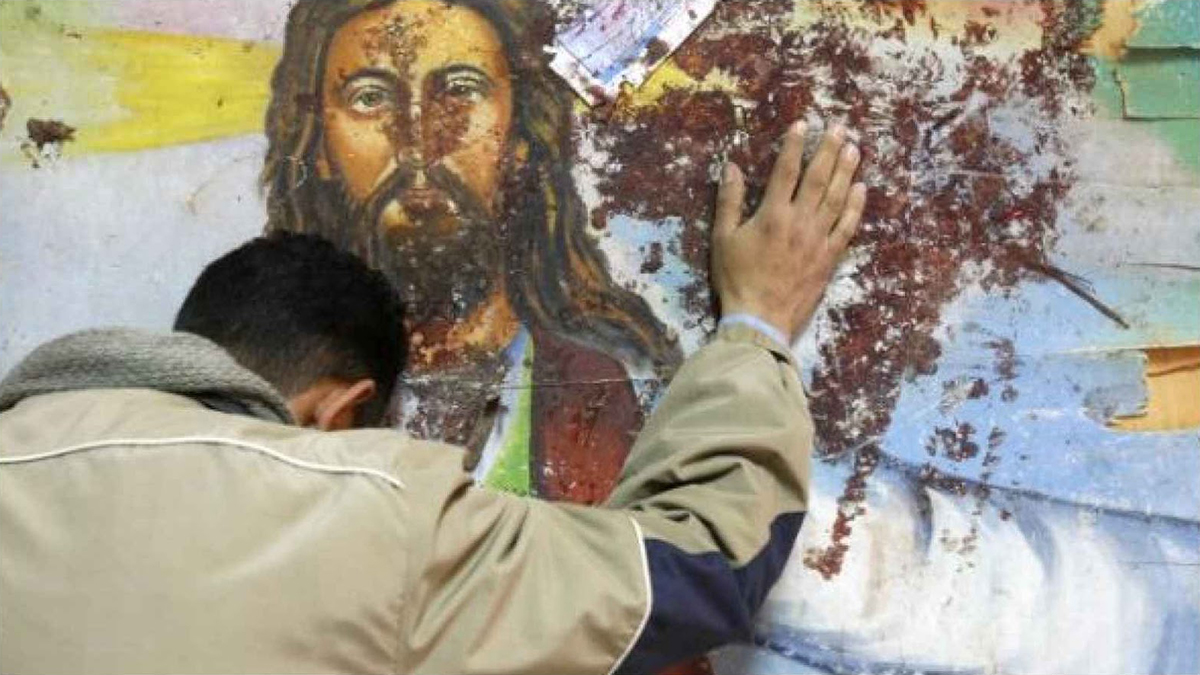Well, thanks to Tasmania’s notorious weather, I didn’t get to see the Great Conjuction of Jupiter and Saturn. Which might well be a fitting finale to 2020. I wrote that the “Christmas Star”, as some called it, might yet be a harbinger of good tidings for 2021.
Certainly, for the world’s Christians, 2020 has been another year where the light of hope has been all but obscured by the darkness of persecution.
Whether it be the wave of desecration of Christian sites which has swept Europe in the aftermath of mass immigration from the Middle East and North Africa, or the bloody massacres of Christians that are becoming all-too-commonplace in parts of the world, the persecution of Christians is reaching staggering proportions..
Naysayers sniffed at the billions pledged to rebuild Notre-Dame-de-Paris after the devastating fire of 2019, but that only demonstrated their failure to comprehend the nature of sacredness. Notre Dame is not just one of the most famous and beautiful structures in the world, it is a sacred place. Along with Parisians, we mourned the damage to Notre Dame in the same way we are shocked by the desecration of Jewish graveyards and Buddhist monuments or the storming of a mosque.
Christmas Day is set aside as sacred because it celebrates the birth of Christ. Houses of worship are consecrated to distinguish their divine purpose and set them apart from the mundane[…]The notion of the sacred is so intrinsic to human beings that it exists in cultures all over the world. Yet the value is difficult to define in material terms and impossible to quantify for the purpose of public policy. The pre-political, transcendent nature of the sacred has left it vulnerable to the march of modernity in the West and the militant atheism of communist states. The modern soul is stirred less by the idea of God than that particular type of revulsion felt when barbarians attack Christian churches, graffiti swastikas on Jewish temples, attack Muslims in prayer or destroy the sacred sites of Indigenous peoples[…]
We venerate the sacred because it connects our ancestors to the living and souls yet to come into the world. It is the essence of the conservative tradition and the foundation of culture. More immediately, it provides a place of refuge from the transient worries of the world and sets our mind on higher things, God, divinity, truth and the better angels of human being. For the same reason, the sacred is a perpetual target of tyrannical regimes.
But the persecution of Christians today goes far beyond dethroning the sacred meaning of “the holiday season”, or tearing down crosses. Along with Uyghurs and Falun Gong, Christians are targeted for persecution by the Chinese Communist regime.
Worse, in many parts of the world, Christians are being slaughtered in staggering numbers.
In recent years, the persecution of Christians has reached unprecedented levels. A 2019 report commissioned by British foreign secretary Jeremy Hunt found Christians constitute 80 per cent of the world’s victims of religious persecution. Yet only about 30 per cent of religious followers are Christian.
This month, the US State Department designated 10 states as “Countries of Particular Concern” for violating religious freedom: Myanmar, China, Eritrea, Iran, Nigeria, North Korea, Pakistan, Saudi Arabia, Tajikistan and Turkmenistan. The majority of states guilty of systematic religious persecution are communist or Islamist. A common feature of the persecution is arbitrary arrest, vigilante violence and the destruction of sacred Christian sites. According to the latest World Watch List, 9488 churches or Christian buildings were attacked in 2019. An average of eight Christian people were killed a day for their faith.
Religious persecution has long-term effects.
For example, in 1948 there were 55,000 Jews in Yemen; today there are fewer than 50. Syria was home to some of the most ancient Christian communities in the world. Was.
At the height of its power, Islamic State held about 40 per cent of Iraq and about a third of Syria. Christians who remained were targeted by jihadis and subjected to horrific deaths. Speaking to Open Doors, Iraqi pastor Father Adel said 45,000 Christians lived in Mosul before Islamic State invaded. Now there are 50[…]
For Christians, Christmas represents the hope of Christ coming into the world. It matters everywhere, but especially where Christians are persecuted because the birth of Christ is a promise that they, too, shall overcome. The sacred meaning of Christmas infuses the poetic verse of the gospel according to St John: “In the beginning was the Word, and the Word was with God, and the Word was God … In him was life and the life was the light of men. The light shines in the darkness, and the darkness has not overcome it.”
The Australian
The “Christmas Star” may have been veiled in cloud in Tasmania, but let us hope that its light shines in the darkness for the world’s persecuted Christians.
Please share this article so that others can discover The BFD

